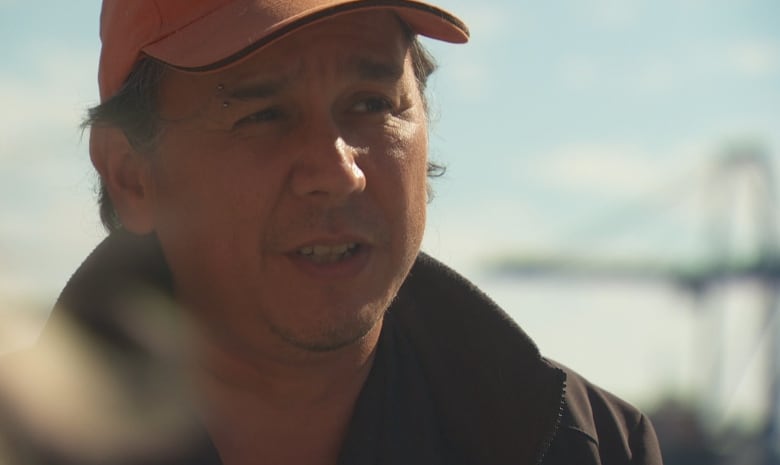The ’60s Scoop robbed his culture. Now he restores it through storytelling

When social workers visit David Smith’s community, his sister takes him into the woods.
As a young kid, Smith asked if they were playing hide and seek. I told him they were.
Then they lost one day.
“It was too big to lose that match because I and my brother were sent off,” Smith said. “We both had the same thing happen to us – we got adopted and lost everything.”
Smith and his brother were taken from the Metepenagiag Mi’kmaq Nation as part of the scoop of the 1960s, a period in Canadian history from 1961 to the 1980s, when Aboriginal children were taken from their families and adopted mainly by Canadian settlers.
Smith said he was relatively lucky when talking.
“I had a good family. I love my family. They are still my family. Now I have two families.”
Since the beginning of the year, Smith has reconnected with his culture through First Nations Storytellers, a company he and business partner Gail Bremner launched this summer that provides tours of Aboriginal history in Saint John and surrounding areas in New Brunswick.

“I decided, as a way for me to take back my culture, that I would do that and devote all of my time and energy to learning my culture and my language, learning my family history, and sharing as much as possible with people,” Smith said. “So that they can get a better understanding of who we are.”
Forty-four years ago, David Smith was moved from his home in Metepenagiag Mi’kmaq Nation. Now, he’s reclaiming his culture by sharing St John’s Aboriginal history.
For Smith in particular, he believed that truth and reconciliation should revolve around supporting Indigenous communities, through infrastructure and attitudes.
“I just want to see a world where not all rivers flow away from society,” he said.
“Not all paths lead me away from society. Not every government policy or all social convention takes me away from society.”
Loss of culture and search for communication
Despite his love for his adoptive family, Smith said his life away from Metepenagiag was isolated.
“I’ve lived in a society where I’m the only one of its kind…and they, kids, aren’t very tolerant. And remember, kids weren’t alone either.”
But Smith was still searching for his culture anywhere he could.
“Secretly I was in the woods, looking at plants, or saving animals and looking for any connection: movies, videos, books, anything I could find that connects me,” he said.
“But I still tried to hide it so much that I met my biological mother once. And I didn’t have the courage to come up to her and say hello.”
When Smith was 16, he was at a gymnasium for a martial arts tournament and spotted a group of Aboriginal parents and children. Smith said that whenever he saw other Aboriginal people, his little eyes naturally gravitated toward them—looking for something to help him understand where he was from.

His eyes were dumbfounded at a certain woman he saw.
“It was like when you’re staring at someone in a crowd and you don’t know why you’re staring at them,” he said.
He imagined it might be his mother, but he couldn’t bring himself to go and talk to the group.
“I guess at one point, I didn’t want to be, I just wanted to be normal, which I did until recently.”
He will never have the opportunity to talk to his mother, who died when he was 19. At her funeral, he knew who she was and realized she was at the gym that day.

“I’ve dreamed for years about that moment where I’d walk in and say hi. And just…it never happened.”
Decades later, it was the family that set him on his new path.
Smith has a 16-year-old daughter and wants her to know he was trying to do something important.
In January, he quit his job and embarked on his expedition.
“I hope she makes the journey herself eventually, if not today, sometime in the future, because I don’t want my culture streak to end with me.”
A trip anyone can join
One thing Smith wants to make clear is that he doesn’t know everything there is to know about Aboriginal history and culture.
“I’m not the end, everything, I’m just a guy learning and I want to share my journey.”

He’s also trying to fill a gap in St. John’s tourism offerings, which his business partner Bremner noted before founding the company.
One of the company’s tours takes visitors on a walk through time by the Wolastoq River or the St. John’s River. On it, Smith describes the rich history of the area that existed before the arrival of Samuel de Champlain.
During the company’s first summer, Smith said he spoke to groups of 100 and groups of two.
“I will speak to anyone who is willing to listen and has open ears.”
























No comments:
Post a Comment
Please: Share your reaction, your thoughts, and your opinions. Be passionate, be unapologetic. Offensive remarks will not be published. We are getting more and more spam. Comments will be monitored.
Use the comment form at the bottom of this website which is private and sent direct to Trace.